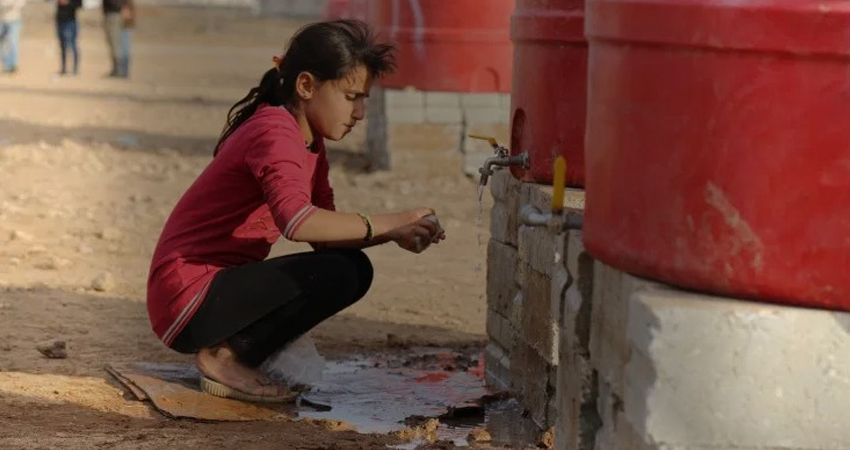1. Legal analysis
A) International Humanitarian Law
Water is indispensable to civilian populations. It is not only essential to drink, but also for agricultural purposes and sanitation, all the more important in the wake of the COVID-19 sanitary crisis. Although at first neglecting the significance of water and food for civilian populations caught in armed conflicts, drafters of the Geneva Conventions’ Protocol remedied the gap by including, in Article 54 Additional Protocol I and in Article 14 Additional Protocol II for International and Non-International Armed Conflicts (IACs and NIACs) respectively, the protection of objects indispensable to the survival of the civilian population.
Involving two states, that of Syria and that of Turkey, the ongoing conflict currently taking place in northeast Syria is of international character. As a result, and in application of these provisions, in IACs:
It is prohibited to attack, destroy, remove or render useless objects indispensable to the survival of the civilian population, such as foodstuffs, agricultural areas for the production of foodstuffs, crops, livestock, drinking water installations and supplies and irrigation works, for the specific purpose of denying them for their sustenance value to the civilian population or to the adverse Party, whatever the motive, whether in order to starve out civilians, to cause them to move away, or for any other motive.
When attacking Alok water station, thus depriving 600 000 civilians from accessing water, Turkey is thus is employing methods prohibited by and in breach of International Humanitarian Law (IHL).
B) International Criminal Law
A breach to IHL, attacks on protected objects can constitute a war crime. Additionally, as has been shown in other contexts, including that of Sudan, restrictions on water can amount to crimes against humanity and, when done with the ulterior purposes to attack specific populations, that can be constitutive of the crime of genocide, as argued by the International Criminal Court’s Office of The Prosecutor.[1]
C) International Human Rights Law
Finally, the restriction on water also violates several basic human rights, such as the right to water, proclaimed by the General Assembly and the Human Rights Council as part of binding international law in 2010 and that to life.[2]
2. Background
Alok water pumping station,[3] located east of the city of Ras al-Ayn/Sari Kani, is the main source of drinkable water for around 600.000 people in northern Syria, specifically in the city of al-Hasakah and the town of Tall Tamr and their suburbs, which have the makeshift camps of al-Hawl, al-Areesha (or al-Sadd) and Washo Kani (or al-Twaina), which host tens of thousands of Syrians, Iraqis, and foreigners who lived in areas formerly held by ISIL (also known as Daesh).
Alok water station was established in 2010, for the purpose of collecting and pumping water, as a solution to the then water crisis in al-Hasakah and outskirts. In this context, 30 artesian wells were dug near the village of Alok Sharqi, located 10 km east of Ras al-Ayn, with a pump capacity of approximately 175.000 cubic meters of drinkable water per day.
The station has a 25.000 m³ water reservoir and 12 large pumps transport water through 67 km-long pipes to al-Himme area in northern rural al-Hasakah. From there, the water reaches residential blocks.
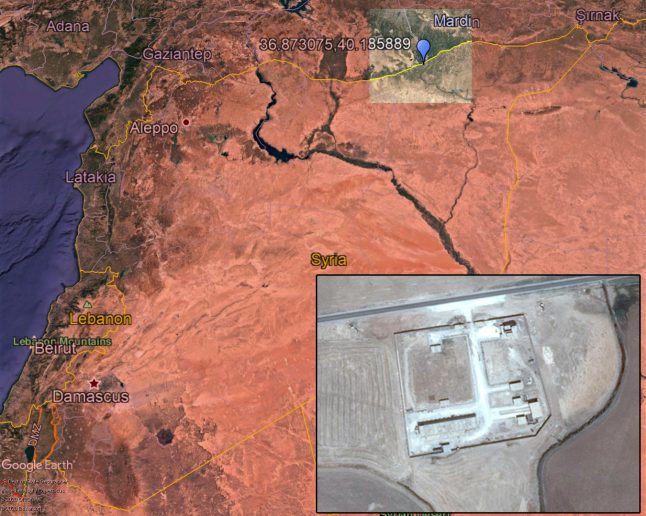
Image (1): the Alok water pumping station location on Syria’s map. Credit: Google Earth.
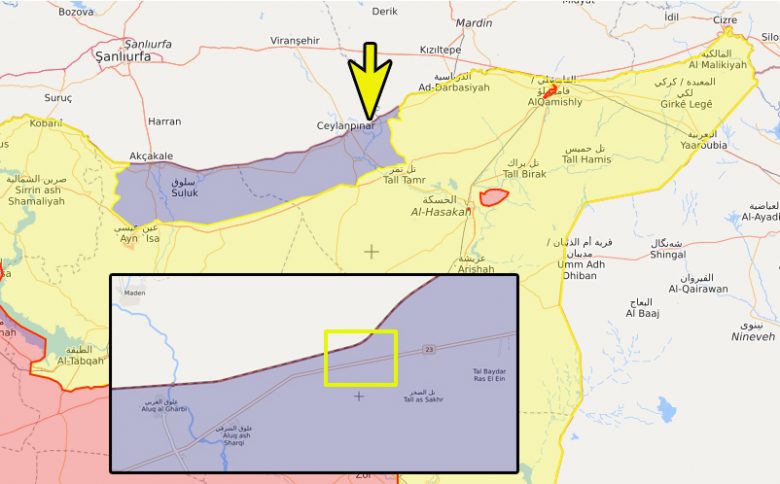
Image (2): who controls what in Syria’s northeast.
Areas in yellow are under the control of the Autonomous Administration’s SDF forces (supported by the US-led coalition in its fighting against the Islamic State). Areas in blue are controlled by Turkey and allied Syrian opposition groups. Areas in red are under the control of the government forces and their Russian allies.
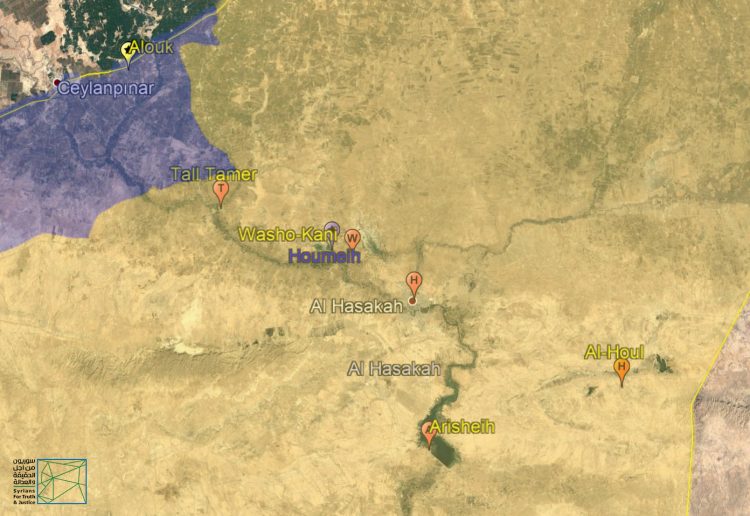 Image (3)
Image (3)
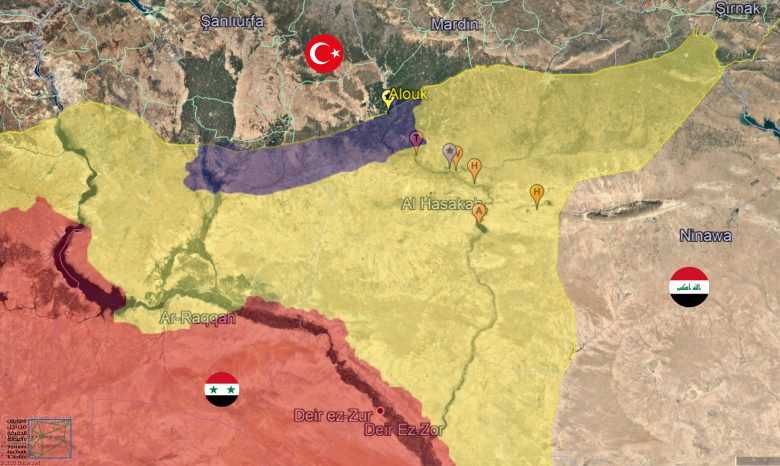
Image (4) and (3): Maps showing the areas which depend mainly on the Alok water pumping station.
3. The first interruption of the Alok water pumping station:
On October 9, 2019, Turkish President Recep Tayyip Erdoğan announced the launch of Operation Peace Spring into the Syrian territory, with the support of Syrian opposition’s National Army. Just a day before the start of the operation, the National Coalition for Syrian Revolutionary and Opposition Forces released a statement supporting the Turkish announcement of a looming military operation in the region:
“The Coalition supports the efforts of the National Army, the Ministry of Defense and those of the Joint Chiefs of Staff. We confirm the readiness of our National Army to combat terrorism in cooperation and joint action with brothers in Turkey.”
The Minister of Defense, Salim Idris, announced on October 7, that the National Army had completed the necessary training for the upcoming military operation in northeastern Syria. This was preceded by other military arrangements, as the National Army and the National Front for Liberation announced their full integration on October 5, 2019.
Only a few hours after the start of the military operation in northeast Syria, the Alok water station was rendered inoperable by Turkey’s air and ground bombing. The facility was targeted with several bombs that hit the power lines feeding it, causing the complete stop of the water pump into al-Hasakah and its suburbs, where tens of thousands of people had sought shelter during the first days of the Turkish military operation.
In mid-October 2019, Turkish forces and allied armed groups of the National Army, managed to fully control the Alok pumping station. However, the station remained out of service, due to the damage caused to it by bombings, and to the rob stealing of its essential equipment by individuals believed to be affiliated with Syrian rebel groups, according to local sources.
Operation Peace Spring resulted in the occupation by Turkey of a vast area to the north of Raqqa, between Ras al-Ayn and Tell Abiad, 120 km along the northeast Syrian borderline, after the US-led coalition forces withdrew from it.
4. Electricity in exchange for water:
The Autonomous Administration along with the Syrian Democratic Forces/SDF, which share control over the city of al-Hasakah, made attempts to relaunch the Alok water pumping station with direct assistance from the Russian military command in northeastern Syria that had held talks with Turkey and intervened more than once to urge Turkish forces to operate the station. However, in exchange for resuming the water pump from the Alok station, Turkey requested maintaining the Mabrouka power station, located under Turkey and allies’ control to the west of Ras al-Ayn, and supplying it with electricity from the Tishrin Dam. The dam is jointly controlled by the Syrian government and Autonomous Administration. The request thus entailed the supply of Ras al-Ayn and Tell Abiad with power in exchange for providing al-Hasakah and outskirts with water from the Alok station.
-
Stealing equipment from the Mabrouka power station:
The Mabrouka power station is located on the M4 international highway,[4] 14 km away from the town of Mabrouka. The station is supplied by Tishrin Dam and in turn provides power to the province of al-Hasakah and other areas in al-Jazira region, northeast Syria.
However, during last October’s Turkish offensive, the Mabrouka power station was rendered inoperable. The station, that was mainly controlled by Al Safwa Al Islamiya Battalions, also known as al-Safwa Division, saw indeed its supplement suspended by the SDF and many of its equipment, including generators, stolen by fighters of the Syrian opposition armed groups.[5]
For more information in this regard, STJ met a farmer, who works in a field adjacent to the power station.[6] According to him, electricity to the station was cut off by the Autonomous Administration few days after the area was taken by Turkey and allied Syrian rebel groups, during Operation Peace Spring, and the latter robbed equipment and large quantities of copper from the same station. He added:
“In the second half of October 2019, a Syrian armed opposition group – that I couldn’t identify – stationed at the power station, looted and sabotaged equipment in order to extract copper. They got large quantities of it and transferred it to unknown destinations.”
5. Russian-Turkish talks to rehabilitate Alok power station in November 2019:
On November 9, 2019, after talks with Russia, Turkey allowed a group of workers with delegates from the Syrian State Electricity Corporation in al-Hasakah, and the Syrian Arab Red Crescent, to enter the Alok water station for the first time after Operation Peace Spring. The objective was to check it and study how to rehabilitate it. An engineer from the visiting delegation talked to STJ:[7]
“A Russian patrol coordinated with the Turkish forces to allow us to enter the Alok station. After inspecting the condition of the station, we detected two electric transformers and the lines feeding them had been stolen. However, electricians repaired the power lines feeding the Alok station and connected them with those of the Ad Darbasiyah power station, which had also been damaged by bombings. They also fueled the alternate power generators in order to run them in due course.”
According to the source, the Turkish forces didn’t allow workers to turn on the Alok water station and pump the water back to al-Hasakah and its suburbs that day. Meanwhile, the population of al-Hasakah and those displaced to it after Operation Peace Operation were forced to purchase their need of drinking water from unsafe sources, such as private tanker trucks, at prices ranging between 500 and 1000 Syrian Pounds per barrel.
6. Resuming water pump from the Alok station, after 35 days of suspension: the first agreement
Talks between Russian and Turkish sides led to an agreement that provided for the reactivation of Alok water pumping station in exchange for maintaining the Mabrouka power station by the Syrian government and the Autonomous Administration and supplying it with 7 MW of electricity from the Tishrin Dam.
Thus, on November 13, 2019, the Alok station was turned back on after 35 days of suspension and 4 days of maintenance. One of the engineers supervising the Alok station spoke to STJ:[8]
“We managed to resume supplying water through the Alok water station after re-supplying it with electricity from the Ad Darbasiyah power station, but not at full capacity. Only 14 wells have been operated and thus drinking water has been pumped to the residential blocks – about 60,000 m³ per day – through the water pipes extended from Ras al-Ayn to al-Hasakah.”
Several days later, on November 17, 2019, 10 additional water wells had been operated after providing them with power. This brought the number of wells operating in the Alok station to 24, producing more than 100,000 m³ of water per day, contributing to solving the problem of water scarcity in al-Hasakah city and its countryside, according to the Water Directorate of the Autonomous Administration.
7. Relaunching the Mabrouka power station:
On December 6, 2019, on the basis of the Russian-Turkish agreement, a Russian military patrol escorted a team of electricians, formed by the Syrian government and the Autonomous Administration, to Mabrouka power station, which had been rendered inoperable by the offensive of October 2019.
On December 9, 2019, the work to maintain the Mabrouka power station began. One of the electricians spoke to STJ:[9]
“A number of transformers and electrical equipment have been stolen from the station after being controlled by the Turkish forces and allied Syrian militias. The latter allowed us to work on repairing the station only three hours two days a week, on Mondays and Tuesdays, which led to a delay in the completion. It took us about three weeks to operate the station.”
Early 2020, the Mabrouka power station was put in service again after being supplied with 7 MW of electricity from Tishrin Dam, jointly run by the Syrian government and the Autonomous Administration. In return, water pumping from Alok to the city of al-Hasakah and its suburbs was resumed, in accordance with the agreement concluded between Russia and Turkey.
8. Ankara disavows the first agreement:
On February 24, 2020, Turkish forces turned off Alok water station in Ras al-Ayn and expelled workers from it without explaining the reasons. As a result, a water crisis erupted in the city of al-Hasakah, the town of Tall Tamr and their suburbs.
Water interruption led people to seek alternatives, mostly unsafe, such as water trucking, as reported by Hajjar Omar, 31, who was displaced from Ras al-Ayn to al-Hasakah with his wife and three children:[10]
“The 1000 liters of water is sold for 4000 Syrian pounds. This amount of water can provide my family for three days only. As a displaced, I can’t afford that much, so we are trying to reduce our use of water to the minimum.”
Moreover, the water sources the residents rely upon during the failure of the Alok water station may not be safe. They are not tested or watched, according to Najah Abdel Karim, 35, from the town of Tall Tamr:[11]
“We are suffering much because of the water outages, as the water we buy from the water trucking is unsafe for drinking since it is not pasteurized and has high levels of lime. Therefore, we either have to buy bottled water for drinking or to boil the water we buy from the tank trucks, so that we and our children don’t get any diseases.”
The water tanker trucks, belonging to SDF, bring water to al-Hasakah from the village of Tell Brak and adjacent areas, and provide it to residents for free. However, according to the Autonomous Administration’s Water Directorate, the capacity of all the dedicated water trucking is no more than 4000 m³ of water. This represents the equivalent of the capacity of only one water well in the Alok station, which accounts for 30 of them. This obviously means that the water trucking doesn’t cover the water needs of all residents at the same time, and the journey of the tanks from Tell Brak to al-Hasakah takes days, owing to the distance between the two locations.
9. Russian official discontent with Ankara’s lack of commitment to the agreement:
Ten days after the cessation of Alok water station, on March 4, 2020, a press conference was held at the Russian base in Qamishli/Qamishlo. Russian military command accused Turkey of impeding Alok station’s relaunch and of non-commitment to the agreement signed with it.[12]
General Anatoly, the commander of the Russian military forces in northeastern Syria, said that he discussed with Burhan Aktaş, head of the Turkish Coordination Center, by phone, the relaunch of the Alok station. Later, on February 26, 2020 the two met physically in the Turkish city of Nusaybin to discuss this same subject.
Anatoly confirmed that the Turkish side did not adhere to the plans they put together, despite the assistance given by Russia to SDF and the Syrian government in maintaining the Mabrouka station and supplying it with electricity from the Tishrin Dam. He added that the Autonomous Administration cut off the power to the Mabrouka station in response to Turkey’s turning off the Alok water station.
10. Allegations to justify Turkey’s disavowal of the agreement:
Following the Russian accusation against Ankara, Ras al-Ayn’s local council, affiliated with the Syrian opposition, posted an update on its official Facebook page on March 4, 2020, explaining that turning off the Alok water station was a response to the interruption of power from the Tishrin Dam, to the cities of Ras al-Ayn and Tell Abiad, accusing the Autonomous Administration and the Syrian government of cutting the power to the Mabrouka station.
According to the Facebook post by Ras al-Ayn’s local council – formed after Turkey and its ally, the National Army, took over the city – the power supplement of Alok water station is from the Tishrin Dam. Thus, re-pumping water requires resuming the power supply to the city of Ras al-Ayn.
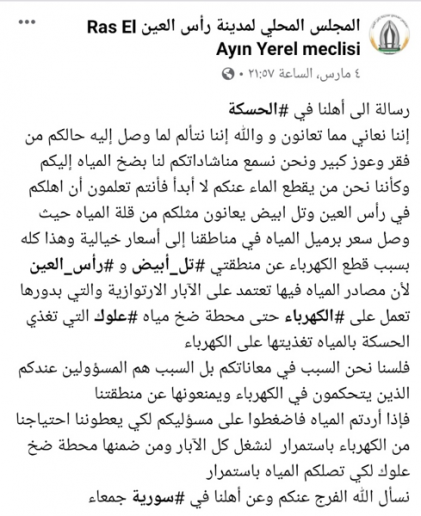 Image (5): the post published by the Ras al-Ayn’s local council on its official page on Facebook on March 4, 2020.
Image (5): the post published by the Ras al-Ayn’s local council on its official page on Facebook on March 4, 2020.
In this regard, head of Ras al-Ayn’s local council, Miree al-Yousif, told Enab Baladi Newspaper on February 25, 2020,[13] that the Alok water station draw its power from the Tishrin Dam, which is controlled and managed by the Syrian government and Russia, and that it was interrupted due to cutting off the power to it. However, what he said was proven false for several reasons:
- After 35 days of suspension and four days of maintenance, Alok water station resumed pumping on November 2019, supplied with power from Ad Darbasiyah station, not the Mabrouka station.
- It is possible to supply the Alok water station from al-Swaydia generating station, in rural Al-Malikiyah/Derik city in the event of a power outage from the Ad Darbasiyah station or from the Tishrin Dam.
- The station has backup power generators.
- Alok water station was operating in the period between November 13, 2019 and early 2020, while Mabrouka station was still out of service.
Human Rights Watch issued a report on March 31, 2020, which confirmed that the Mabrouka power station does not provide Alok pumping station and that it has alternative power sources enough to operate it.[14]
11. Civilians in Ras al-Ayn haven’t had access to electricity since the Turkish offensive into the city:
Civilians who return to the city of Ras al-Ayn after Operation Peace Spring, haven’t been provided with electricity even when the city was supplied from the Tishrin Dam through the Mabrouka power station.
In the same context, a civic activist who asked not to be identified for security reasons, told STJ that he returned to the city in November 2019 and is living with his father there. He confirmed that the Turkish forces and allied Syrian opposition groups haven’t fix the power lines in the city, which were damaged by the Turkish bombings, and added:[15]
“Only 5% of the returnees to the city receive electricity 6 hours of a day, from generators owned by opposition armed groups’ members or their relatives, for SP.6000 per amp, while it used to be provided for around SP.1000 prior to the Turkish offensive on the city.”
The same activist explained that Turkish forces and allied militias of the National Army in the city of Ras al-Ayn reconnected the power lines to their military and civilian centers, while houses of civilians are still out of electricity since the Turkish offensive on the city in October 2019.
STJ field researcher reported that in the periods when the Mabrouka power station is supplied from Tishrin Dam, electricity reaches parts of the city of Tell Abiad and the area between it and the city of Ras al-Ay, where the power lines aren’t damaged or robbed during Operation Peace Spring.
12. Bargaining for an additional load of electricity: the second agreement
On March 5, 2020, a day after the Russian announcement, Alok water station was put back in service after an 11 days-interruption, and the expelling of its workers. After consent from Turkey, the station resumed pumping water to the city of al-Hasakah, the town of Tall Tamr and their suburbs.
On this, an engineer supervising the team of electricians, jointly formed by the Autonomous Administration and the Syrian government spoke to STJ to explain that Turkey allowed the resuming of Alok station after discussions and understandings concluded with the Russian side. He added:[16]
“Turkey stipulated to raise the power capacity from 7 MW to 20 MW in order to supply Ras al-Ayn, Tell Abiad and their suburbs. However, after negotiations with the Russians, Ankara allowed the relaunching of Alok station in exchange for providing Mabrouka station with 9-10 MW of electricity.”
As of March 10, 2020, the number of wells pumping in Alok water station have been raised to 26 out of 30, increasing the daily pumping capacity to 120.000 m³ of drinking water.
13. Another interruption to Alok station on March 21, 2020:
On March 21, 2020, Turkish forces cut off water supply to 600.000 people in northeast Syria, without disclosing reasons. That led 49 Syrian organizations to issue a joint statement condemning the repeated interruptions to the water supply and demanding that Alok water station be sided from political and military conflicts, and the equitable distribution of water to residents in northeast Syria without discrimination of any kind.[17]
On the reason for interrupting the Alok water station, an engineer in the team of electricians, jointly formed by the Autonomous Administration and the Syrian government, confirmed that Turkey stipulated supplying the Mabrouka power station with 23 MW of electricity in exchange for turning on the Alok water pumping station:[18]
“The Tishrin Dam feeds Mabrouka power station with 9-10 MW of electricity, but Turkey asked to raise the capacity to 23 MW, to supply the areas it had occupied as a result of its offensive into northeastern Syria. But if this be done, it will be at the expense of the rest of the al-Jazira, which is under the control of the Autonomous Administration.”
According to the source, the city of Ras al-Ayn used to be supplied with 10 MW of electricity, before the Turkish offensive into northeastern Syria.
14. The risk of water interruption amid COVID-19 outbreak:
According to STJ field researcher, the repeated interruption of water led al-Hasakah people to rely on unsafe water sources, which poses a serious threat to their lives as efforts ramp up to prevent COVID-19 spread.
In this regard, Dr. Mustafa al-Kurdi, who works in al-Hasakah hospitals, noted that the interruption of the Alok water pumping station had disastrous consequences for residents of the areas supplied by it:[19]
“The water cut caused a serious crisis and led people to seek alternative and potentially unsafe water sources. These were insufficient, and led to the lack of hygiene and cleanliness of health centers and hospitals amid the outbreak of the novel coronavirus, putting the population at greater risk of infection.”
Sumiyaa Abdullah, 27, a displaced woman from the city of Deir ez-Zur, currently living with her husband and children in Areesha camp (also known as al-Sad camp) in southern al-Hasakah, explained to STJ that because the water tanks there are filled from mobile water trucks which in turn are filled from the city of al-Hasakah, turning off Alok water pumping station affected 13.000 IDPs in the camp.[20]
In a statement released on March 23, 2020,[21] Fran Equiza, UNICEF Representative in Syria, confirmed:
“interruption to key water station in the northeast of Syria puts 460,000 people at risk as efforts ramp up to prevent the spread of Coronavirus disease… The interruption of water supply during the current efforts to curb the spread of coronavirus disease puts children and families at unacceptable risk. Handwashing with soap is critical in the fight against COVID-19.”
15. A further agreement on March 26, 2020 to resume water pumping:
Several rounds of negotiations between the Russian military command in northeast Syria and the Turkish forces led to an agreement provided for turning on the Alok water pumping station on March 26, 2020, five days after the last interruption.
According to the engineer supervising the team of electricians, jointly formed by the Autonomous Administration and the Syrian government, under the last agreement between the Russian and Turkish sides, Mabrouka power station, located west of Ras al-Ayn would be supplied with 12 to 15 MW of electricity from Tishrin Dam, controlled by the Syrian government and the Autonomous Administration, in exchange for Turkey’s turning on the Alok water pumping station. He added:[22]
“The Syrian government and the Autonomous Administration did not agree to the Turkish condition requiring Mabrouka power station to be supplied with 23 MW of electricity from the Tishrin Dam, because that was impossible. Instead, they suggested supplying the station with half of this load. So the two parties agreed, through Russia, to supply the Mabrouka station with 12-15 MW of electricity, in exchange for resuming the water pump from Alok water station by Turkey, with promises from the latter not to harass the workers of the station which was operated following that agreement.”
Despite this, public electricity still does not reach the homes of civilians in Ras al-Ayn due to the lack of maintenance and reconnection of power lines and transformers that were damaged and stolen during and after Operation Peace Spring, according to many statements obtained by STJ from activists and civilians currently living in the city.
16. Another water interruption- weaponizing water and using it as blackmail against the population in northeast Syria:
Despite the agreement, on March 29, 2020, Turkish authorities interrupted water pumping from Alok station to the city of al-Hasakah and its countryside for the second time in less than 10 days. Although it was resumed the next day, the situation seems unstable.
This interruption is the fourth since the launch of the Turkish offensive into northeastern Syria. It became clear that the Turkish authorities intended to interrupt Alok station repeatedly, in an attempt to negotiate with the Syrian government and the Autonomous Administration and to bargain for an additional load of electricity from Tishrin Dam, despite the understandings reached on this regard under Russian mediation.
17. Turkey shells the main water pipe, interrupting the pumping again:
While finalizing this report, specifically on April 2, 2020, we received reports about a new round of shelling conducted by the Turkish forces and allied National Army from Operation Peace Spring areas, which caused damage to the main water pipe connecting the water pumping stations of Alok and Al-Himme, western al-Hasakah.
STJ’s field researcher confirmed that there had been artillery and mortar shelling near the village of Umm al-Keif, 3km north of Tell Tamer. For details, the researcher talked to a member in the team of electricians, jointly formed by the Syrian government and the Autonomous Administration, on April 3, 2020. He explained that the explosion of the water pipe formed a pool of water at the site, thus pumping water from the station would be interrupted temporarily, so that the electricians could estimate the damage and repair it accordingly.
According to the same source, the maintenance workers started repairing the damaged part of the main water pipe of the Alok water pumping station, noting that the pump would be resumed in less than 48 hours.
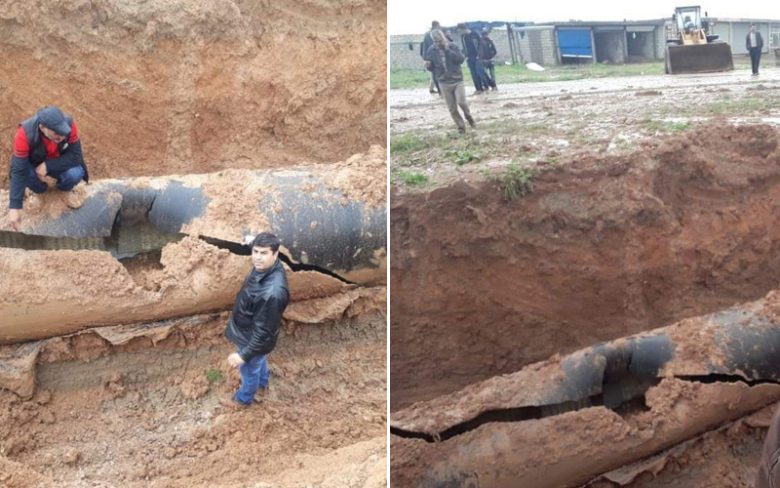
Image (6): Alok pumping station’s main water pipe which was put out of service by Turkey and its allies’ bombardment with mortars and artillery. Credit: “al-Hasakah” Facebook page.
On April 2, 2020, Turkish forces and allied Syrian opposition armed groups stepped up artillery shelling on the western and northern villages adjacent to the town of Tall Tamr, 40 km northwest of al-Hasakah, killing two fighters of the Syrian government forces, wounding 7 others, including a civilian, and causing displacement to a number of civilians towards Tall Tamr.
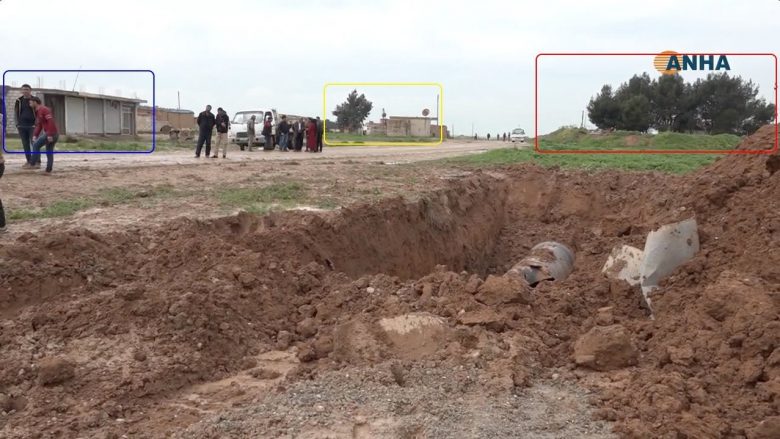
Image (7)
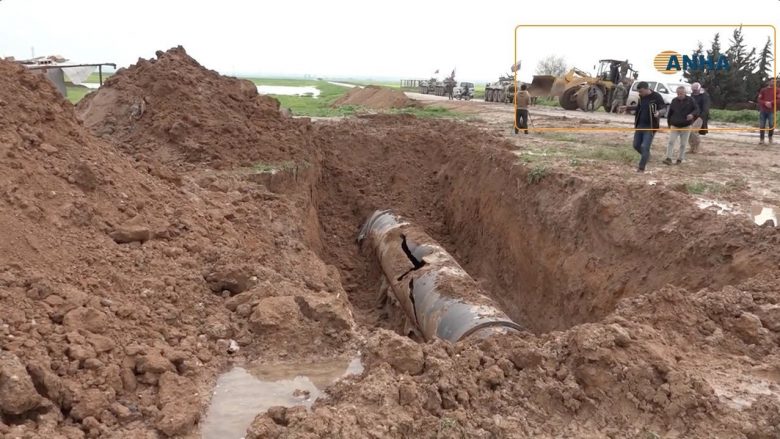
Image (8)
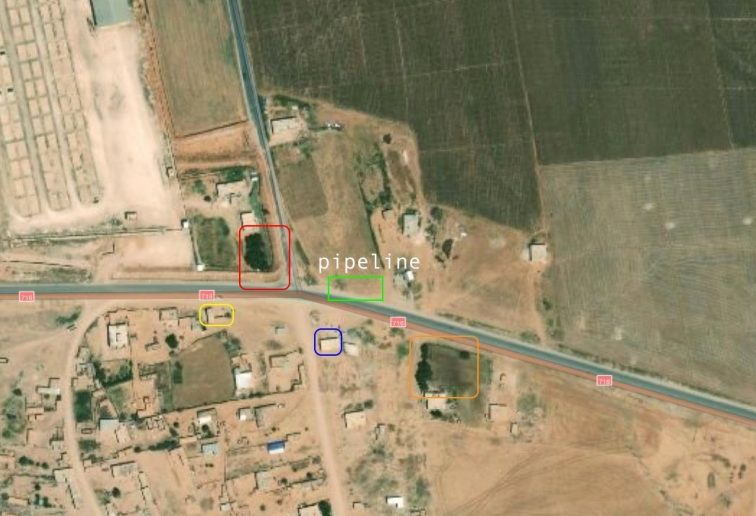
Images: (7,8, and 9) show the damage caused to the main water pipe and the available visual analysis. The images are screenshots taken from a video published by Hawar News Agency.
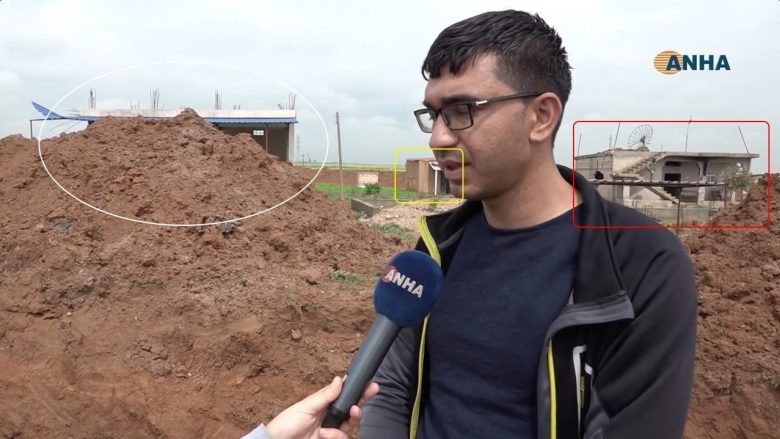
Image (10): a screenshot from the video published by Hawar News Agency.
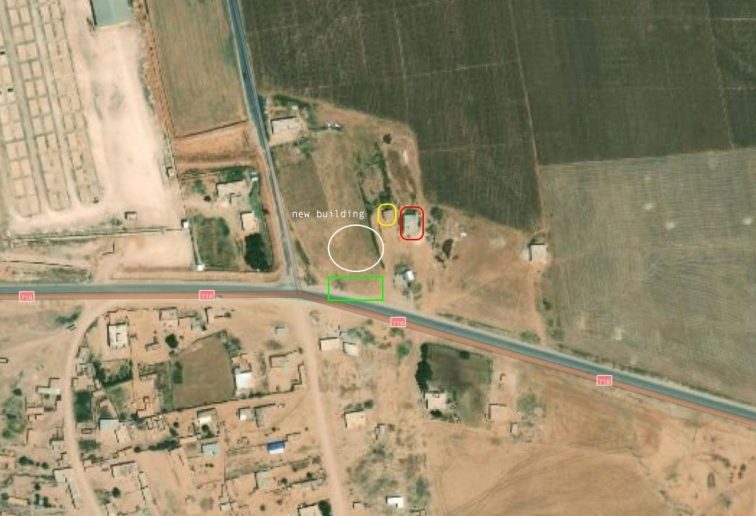
Image (11)
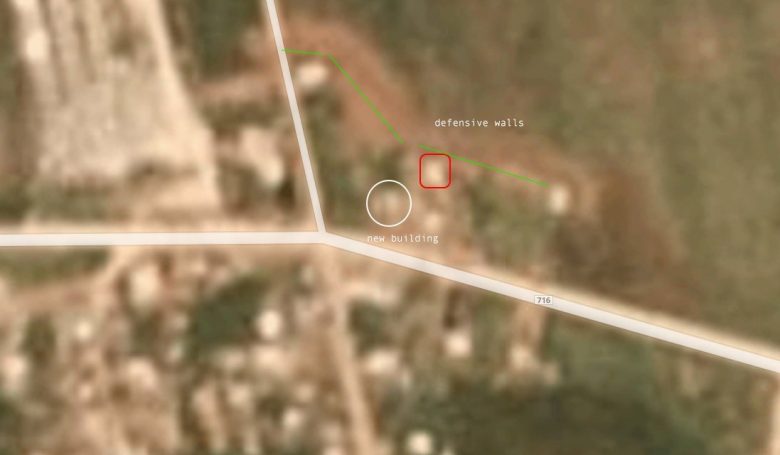
Image (12): a satellite image shows the soil around the bombed water pipe being drilled. Taken on April 3, 2020.
The shelling by Turkey and its allies on April 3, 2020, hit a high voltage power line, known as the 66 KVA line, in the town of Umm al-Keif, causing power cuts to the town of Tall Tamr and 350 villages in its suburbs, supplied by it.
On April 4, 2020, STJ phoned Koran Mohammad, a member of the Technical Committee of the Autonomous Administration in the town of Tall Tamr, who explained that the maintenance teams of the Electricity Directorate managed to reconnect power to the town and suburbs, 24 hours after it was interrupted by shelling:
“The shelling damaged a high voltage power line, one day after hitting a water pipeline of the Alok water pumping station, which is only 500m away from it. Maintenance teams, however, managed to repair it and reconnect electricity.”
The same source added that this was the seventh power outage in the town of Tall Tamr, since the beginning of 2020, due to the damage caused to the power lines by the Turkish-backed Syrian rebels’ shelling on the town.
18. Alternative project for the Alok water pumping station:
In finding a sustainable solution, the Water Directorate of the Autonomous Administration in the city of al-Hasakah announced on March 24, 2020, the start of the installation of a new water pumping station in al-Himme area, west of al-Hasakah, to operate as an alternative to Alok water station.[23] The aim of the project is to provide the city of al-Hasakah and its countryside with drinking water, according to Suzdar Ahmed, the joint head of the Directorate of Water in al-Hasakah, who spoke to STJ, on March 24, 2020:
“The project was formulated after the discovery of groundwater in Al-Himme that tested drinkable according to international standards. The new project includes 50 wells, with an abundance of up to 15 000 m³ per day, and is scheduled to be completed within a month. It will not be of the same capacity of Alok water station, so we are still detecting other sites from which we can extract water.”
A side of implementing the new water station project in Al-Himme, western al-Hasakah, the alternative to Alok water pumping station. Taken on: March 24, 2020. Credit: the Autonomous Administration’s Hawar News Agency.
Recommendations:
- Impose pressure on the Turkish Government to allow providing water to areas deprived of it immediately and urgently and to guarantee that no further water interruption is to happen under any pretext;
- To neutralize the Alok Water Station of the political and military conflicts and to assign its administration to an independent specialized civilian team, under international supervision and surveillance, as well as prevent the Turkish forces from using the station for blackmail;
- To make sure that all the residents in Northeastern Syria will have equal access to water resources without discrimination of any kind.
Recent Updates:
Pumping Alok water was resumed on April 5, 2020, after the main water pipe, connecting the water pumping stations of Alok and Al-Himme, western al-Hasakah, was mended, given that it was damaged by the artillery and mortar shelling near the village of Umm al-Keif, 3km north of Tell Tamer, which the Turkish forces and armed opposition groups carried out on April 2, 2020.
[1] The Prosecutor v Omar Hassan Ahmad AL BASHIR, Prosecution’s request for a finding of non-compliance against the Republic of the Sudan in the case of The Prosecutor v Omar Hassan Ahmad AL BASHIR pursuant to Article 87 (7) of the Rome Statute, 19 December 2014, https://www.icc-cpi.int/CourtRecords/CR2014_10182.PDF
[2] Human Rights to Water and Sanitation, UN Water. https://www.unwater.org/water-facts/human-rights/.
[3] GPS coordinates (36.873075,40.185889).
[4] GPS coordinates of the Mabrouka power station (36°33’29.8″N 39°53’23.9″E).
[5]Al Safwa Al Islamiya Battalions formed in April 2016 by the integration of radical Islamist groups operating in Aleppo, namely; the Minhaj Al-Sunnah Battalions, Rijal Allah Battalion, Mecca Battalion, Al-Quwa Al-Muwahada Battalion, Yusuf Al-Halabi Battalion, Al-Ansari battalion, Omar Bin Abdulaziz Battalion, the Engineering Battalion and Saif Allah Battalion.
[6] The interview was conducted online on March 29, 2020.
[7], [8] The interview was conducted online on March 25, 2020.
[9] The interview was conducted online on March 24, 2020.
[10], [11] The interview was conducted online on March 29, 2020.
[12] “A Russian general reveals details of negotiations with the Turks to resume pumping water to al-Hasakah and Tall Tamr”, Kurdistan 24, March 2, 2020. (Last visit: March 31, 2020). https://www.kurdistan24.net/ar/news/3c5df9d5-e063-4b05-b011-43b44af56666
[13] “Prompted by Russian acts… Ras Al Ain’s local council cut off the water to al-Hasakah”, Enab Baladi, February 25, 2020, (last visit: March 31, 2020) https://enabbaladi.net/archives/365870 See also: “Organizations condemning the interruption of the Alok station, northeast Syria”, Enab Baladi, March 28, 2020, (last visit: March 31, 2020) https://enabbaladi.net/archives/373207
[14] “Turkey/Syria: Weaponizing Water in Global Pandemic?”, HRW, March 31, 2020, (last visit: March 31, 2020), https://www.hrw.org/news/2020/03/31/turkey/syria-weaponizing-water-global-pandemic
[15] The interview was conducted online on March 30, 2020.
[16] The interview was conducted via phone on March 25, 2020.
[17] “49 Syrian Organizations Condemn Turkey’s Intentional Interruption of Water in Northeastern Syria”, STJ, March 27, 2020, (last visit: March 31, 2020), https://stj-sy.org/en/49-syrian-organizations-condemn-turkeys-intentional-interruption-of-water-in-northeastern-syria/
[18] The interview was conducted via phone on March 23, 2020.
[19] The interview was conducted online on March 28, 2020.
[20] The interview was conducted online on March 29, 2020.
[21] “Interruption to key water station in the northeast of Syria puts 460,000 people at risk as efforts ramp up to prevent the spread of Coronavirus disease”, UNICEF, March 23, 2020, (last visit: March 30, 2020), https://www.unicef.org/mena/press-releases/interruption-key-water-station-northeast-syria-puts-460000-people-risk-coronavirus
[22] The interview was conducted online on March 28, 22020.
[23] “The Water Directorate to implement a project as an alternative to Alok station in al-Hasakah”, Hawar News Agency, March 24, 2020, (last visit: March 30, 2020), https://hawarnews.com/ar/haber/mdyryh-almyah-tbda-bmshrwa-bdyl-lmhth-alwk-fy-alhskh-h32047.htmlمديرية

